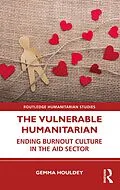The Vulnerable Humanitarian challenges the prevalence of stress and burnout culture within the aid sector, laying bare the issues of power, agency, security and wellbeing that continue to trouble organisations and staff.
Engaging and insightful, this book illustrates the problematic and unrealistic expectations of aid workers through the archetype of the perfect humanitarian, and considers why burnout is so endemic, yet so rarely acknowledged, within aid organisations. The book provides practical means through which staff and managers can reflect upon and discuss damaging organisational cultures and behaviours, and develop a more inclusive and caring work environment. Drawing on original academic research and interviews with national and international aid workers and development experts, the book proposes a feminist, anti-racist and decolonial agenda in challenging oppressive systems and structures within the sector. With extensive professional experience as an aid worker herself, Gemma Houldey also shares her own struggles with mental health and what she has learned from feminist practices for self- and collective care.
Proposing new ways of addressing wellbeing that are sensitive to the multi-faceted personalities and lived experiences of people working on aid and development programmes, The Vulnerable Humanitarian is essential reading both for current aid sector employees and for prospective employees and students.
Autorentext
Gemma Houldey, PhD, is an independent researcher, facilitator and advisor on staff care and culture change in the aid and development sector. For over 15 years she has worked on human rights and conflict programmes for international NGOs including Christian Aid and Amnesty International, and civil society groups in the Occupied Palestinian Territory, Uganda and Tanzania. Trained in several somatic and healing modalities, Gemma designs and delivers support programmes aimed at creating more compassionate and inclusive working cultures, weaving in appropriate practices for self- and collective care.
Klappentext
The Vulnerable Humanitarian challenges the prevalence of stress and burnout culture within the aid sector, laying bare the issues of power, agency, security and wellbeing that continue to trouble organisations and staff.
Engaging and insightful, this book illustrates the problematic and unrealistic expectations of aid workers through the archetype of the perfect humanitarian, and considers why burnout is so endemic, yet so rarely acknowledged, within aid organisations. The book provides practical means through which staff and managers can reflect upon and discuss damaging organisational cultures and behaviours, and develop a more inclusive and caring work environment. Drawing on original academic research and interviews with national and international aid workers and development experts, the book proposes a feminist, anti-racist and decolonial agenda in challenging oppressive systems and structures within the sector. With extensive professional experience as an aid worker herself, Gemma Houldey also shares her own struggles with mental health and what she has learned from feminist practices for self- and collective care.
Proposing new ways of addressing wellbeing that are sensitive to the multi-faceted personalities and lived experiences of people working on aid and development programmes, The Vulnerable Humanitarian is essential reading both for current aid sector employees and for prospective employees and students.
Inhalt
Introduction: Responding to a Life in Crisis
Part I: Deconstructing Stress and Wellbeing in the Aid Sector
Chapter 1: The Perfect Humanitarian: What's Expected of Us and Why it's Problematic
Chapter 2: Stress? What Stress?
Chapter 3: Wellbeing: Lost Connections
Part II: Creating Healthy, Inclusive Work Environments
Chapter 4: Making Wellbeing Inclusive and Central to Aid Practice
Chapter 5: Assessing your Organisational Culture
Chapter 6: Welcoming the Vulnerable Humanitarian: Practices for Self- and Collective Care
Concluding Reflections
